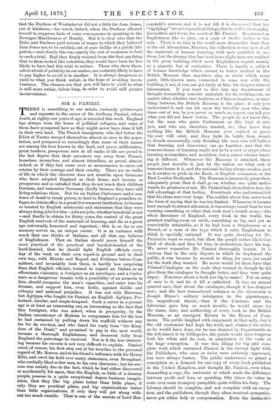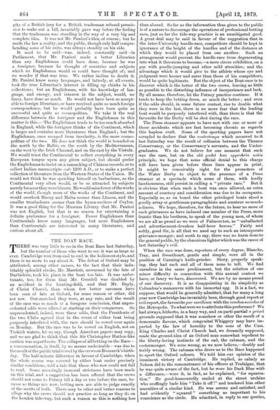SIR A. PANIZZI.
THERE is something, to our minds, curiously picturesque and separate in the career of Sir Anthony Panizzi, whose death, at eighty-one years of age, is recorded this week. England has always been the home of political refugees, and some of them have prospered here as they might never have done if left in their own land. The French immigrants who fled before the Edict of Nantes merged themselves almost at once in the popu- lation, and prospered so exceedingly that some of their names are among the best known in the land, and peers, millionaires, great bankers, prosperous men in all ranks of life are proud to the last degree that their ancestors ran away from France, homeless, moneyless, and. almost friendless, as proud almost, indeed, as if they had come over as mercenaries, to carve otit estates by their courage and their cruelty. There are no walks of life in which Ike observer does not stumble upon Germans who have adopted England as their home, and become so prosperous and so satisfied that they do not teach their children German, and remember Germany chiefly because they have still living relations there. But for an Italian Carbonaro under sen- tence of death to break prison, to land in England a penniless re- fugee, to obtain office in a great Government institution, to become so trusted. by English aristocrats and statesmen that they were always doing jobs for him—jobs are jobs, whether beneficial or not —and finally to obtain for thirty years the control of the great English reservoir of the materials of learning, and die at a great age universally honoured and regretted,—this is, so far as our memory serves us, an unique career. It is at variance with much that one thinks of Italians, and all that one believes of Englishmen. That an Italian should prove himself the most practical of the practical and hardest-headed of the hard-headed, that he should fight English officials every day of the week on their own roped-in ground and in their own way, with Minute and Report and Evidence before Com- mittees, and invariably beat them, is hardly less surprising than that English officials, trained to regard an Italian as an effeminate visionary, a foreigner as an interloper, and a Carbo- naro as a dangerous fanatic with a possibility of an assassin in him, should recognise the man's capacities, and enter into his dreams, and support him, even hotly, against dislike and obloquy and national prejudice. It was not only Iflecenas, but Agrippa who fought for Panizzi, an English Agrippa, Pro- testant, insular, and single-tongued. Such a career in a prosaic age is at least an interesting one, as interesting as the fact that this foreigner, who was asked, when in prosperity, by the Italian executioner of Modena to compensate him for the loss he had sustained by pulling down his scaffold without any fee for its erection, and who dated his reply from "the King- dom of the Dead," and promised to pay in the next world, became a thorough Englishman, and deserved fully from England the patronage he received. Nor is it the less interest- ing because his success is not very difficult to explain. Panizzi owed, of course, his first step out of his troubles to the personal regard of Mr. Roscoe, and to his friend's influence with Sir Henry Ellis, and owed his hold over many statesmen, even Brougham, who cordially liked so few men, to his own character; but his suc- cess was mainly due to the fact, which he had either discovered or accidentally hit upon, that the English, so little of a dreamy people, possess in a quite exceptional degree business imagin- ation, that they like big plans better than little plans, if only they are practical plans, and big organisations better than little organisations, if only they will get along with- out too much rumble. That is one of the secrets of Lord Bea-
consfield's success, and it is not till it is discovered that his " big things " are never practical things, that he will be thoroughly discredited, and it was the secret of Mr. Panizzi. He planned as Englishmen like to plan, on a scale of twelve inches to the mile. There is no idea in the world more dream-like than that of the old Alexandrian Museum, the collection in one spot of all the materials of human learning, with men qualified to use them, but the dreamy idea has been in no slight measure realised in the great building which most Englishmen regard mainly as a gigantic box of curiosities. There is hardly a subject of human knowledge which cannot be better studied in the British Museum than anywhere else, or about which some quiet, little-known man, connected in some way with the building, is not, if you can get fairly at him, the deepest mine of information. If you want to dive into any department of thought demanding concrete materials for its working-out, no matter what, whether rare feathers, or Chinese treatises, or any- thing between, the British Museum is the place, if only you understand it, and. can hit upon the invisible man who, nine times out of ten, be you never so much an expert, can tell you what you did not know before. The people do not know this, but the men who guide Parliament on this kind of sub- ject, and who are, therefore, trusted., do ; they know that nothing like the British Museum ever existed, or possi- bly ever will exist, and they fight its battle from decade to decade successfully, only dreading the men who will believe that learning and democracy can go together, and that the treasure-house of learning ought not to be a sort of crypt where learning accumulates and moulders, but a source whence learn- ing is diffused. Whenever the Museum is attacked, these people just describe it, just let the nation see what sort of treasure-house it is, and the national feeling always awakes, just as it awakes to pride in the Bank, or English commerce, or the East London Dockyards. The Museum is immensely great then, adequately great, then it shall go on, whether one quite under- stands its greatness or not. Mr. Panizzi had, from first to last, the full advantage of that feeling. Everybody who understood felt that his ideas were very large. The conflict about him never took the form of saying that he was too limited. Whenever it became loud enough to attract attention, it was always found that he was wanting something or other that took men's breath away,—the whole literature of England, every book in the world, the greatest reading-room on earth, something as big, and yet as conceivably attainable, as if he had been a Stephenson or a Brunel, or a man of the type which it suits Englishmen to think is specially national. It was quite shocking for Mr. Panizzi to want so much, but then the peopre rather liked that kind of shock, and they let him, in moderation, have his way. We never remember Mr. Panizzi thoroughly beaten. It is curious that in the only dispute in which he displeased the public, it was because he seemed to them, for once, too small for the work they wanted. He never would let them have that Printed Catalogue on the scale they wanted it, though he did give them the catalogue he thought better, and they were quite angry. Nonsense about a book too big to make! Put an army of men to it, and let it fill a cathedral. It was an annual quarrel once, that about the catalogue, though it has dropped now; and the best remembered sentence in the discussion is Joseph flume's solitary indulgence in the gigantesque ; his magnificent threat,—that if the Curators and the Librarian gave him so much trouble, he would move for the name, date, and authorship of every book in the British Museum, as an emergent Return to the House of Com- mons. The public laughed with enjoyment at that sally, but if the old economist had kept his word, and obtained his order, as he would have done, for he was dreaded by Departments as the fish-insect is by bibliopoles, the public would have forgiven both his whim and its cost, in admiration of the scale of the huge conception. It was this liking for big and com- plete work which sustained Panizzi in his eternal fight with the Publishers, who once or twice were seriously oppressed, but were always beaten. The public understood so grand a conception as a demand for one copy of every book published in the 'United Kingdom, and thought Mr. Panizzi, even when demanding a copy, the surrender of which made the difference between profit and loss, or spending fifty times its value in costs over some trumpery pamphlet, quite within his duty. The Library should be complete, and not complete with an excep- tion, and the publishers, though they often received sympathy, never got either help or compensation. Even the instinctive pity of a British jury for a British tradesman refused permis- sion to make out a bill, invariably gave way before the feeling that the tradesman was standing in the way of a very big and complete idea. It was not Mr. Panizzi's idea, of course ; but he made the law a reality, and the public, though only half compre- hending some of his suits, was always steadily on his side.
It used to be said—was, indeed, constantly said—in Parliament, that Mr. Panizzi made a better Librarian than any Englishman could have done, because he was a foreigner, because he thought of countries and subjects which no Englishman would or could have thought of; and we wonder if that was true. We rather incline to doubt it. Mr. Panizzi knew many languages, and latterly, at all events, took the true Librarian's interest in filling up chinks in his collections ; but an Englishman, with his knowledge of lan- guage, and energy, and interest in the subject, would, we fancy, have done as much. He would not have been so accept- able to foreign librarians, or have received quite so much foreign correspondence, but he would probably have been quite as successful and quite as cosmopolitan. We take it the real difference between the foreigner and the Englishman in this matter is this ;—The Englishman tends to be too much absorbed in England, while the foreigner thinks of the Continent, which is larger and contains more literatures than England ; but the Englishman, once escaped from insularity, is the more cosmo- politan of the two. He does not think the world is bounded on the north by the Baltic, on the south by the Mediterranean, on the west by the Irish Channel, and on the east by the Vistula. We would trust the Continental to collect everything in every European tongue upon any given subject, but should prefer the Englishman to insist on a ransacking of Chinese records, or to collect Indian manuscripts ante 1200 A.D., or to make a perfect collection of literature from the Western States of the Union. He would not think he was spending himself on barbarisms, as the Continental very often would, or be so attracted by subjects merely because they were bizarre. He would miss fewer of the works of the world, though more of the works of the Continent, and would overlook Biscay and Malta sooner than Lhassa, and the smaller troubadours sooner than the hymn-reciters of Ceylon. It was a good thing for the Museum Library that Mr. Panizzi was not English, but that is no reason for entertaining a definite preference for a foreigner. Fewer Englishmen than Continentals know many languages, but more Englishmen than Continentals are interested in many literatures, and curious about all.



































 Previous page
Previous page